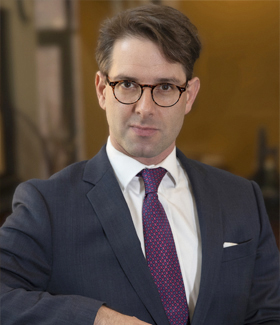
Areas of Specialization
Property, Intellectual Property, Patent, Copyright, Trademark, Trade Secrecy, Privacy, Private Law Theory, Conflict of Laws, Torts, Remedies
Representative Professional Activities and Achievements
James Y. Stern joined the William & Mary faculty in 2013. His scholarship centers on property and private law theory and on intellectual property, privacy, and related issues. His articles have been published in leading legal journals including the California Law Review, the Harvard Law Review, and the Michigan Law Review, and have been cited by various courts, including the U.S. Supreme Court.
At William & Mary, he has taught Intellectual Property, Property, and Torts, as well as advanced seminars and reading groups on topics such as cryptocurrency law and policy and music licensing. He is a recipient of the Thomas Edison Innovation Fellowship from the Center for the Protection of Intellectual Property and the Temple Bar Scholarship from the American Inns of Court Foundation, as well as the Phi Beta Kappa Society’s Rockefeller Award for the Advancement of Scholarship and the Plumeri Award for Faculty Excellence at William & Mary.
Professor Stern previously served as Deputy General Counsel at the United States Department of the Treasury. In that capacity, he oversaw major Treasury Department litigation before the U.S. Supreme Court and other federal courts, worked on national security issues including international sanctions programs and review by the Committee on Foreign Investment in the United States (CFIUS), helped spearhead the development of cryptocurrency regulations and related measures involving oversight of financial institutions, and was involved in a wide range of domestic and international tax policy matters. In addition, he played a major role in the establishment of various Treasury Department programs implemented in response to the COVID-19 global pandemic, totaling more than one trillion dollars. In recognition of his efforts, he was awarded the Treasury Department’s Distinguished Service Award by the Secretary of the Treasury.
Professor Stern received his undergraduate degree from Harvard University and his J.D. from the University of Virginia, where he was elected to the order of the Coif and was awarded the Traynor Prize for the best paper by a graduating student. He subsequently clerked for Judge J. Harvie Wilkinson on the U.S. Court of Appeals for the Fourth Circuit and for Justice Anthony Kennedy on the U.S. Supreme Court.
Professor Stern has participated in litigation involving intellectual property and other matters in various capacities. He is a member of the Virginia bar, as well as an honorary member of the London’s Commercial Bar Association.
Scholarly Publications
Articles and Book Chapters
- Intellectual Property and the Myth of Nonrivalry, 99 Notre Dame L. Rev. 1163 (2024). SSRN.
- Possession, Use, and Exclusion, in Handbook on Property Law & Theory (Chris Bevan ed., Elgar forthcoming 2024).
- Analog Analogies: Intel v. Hamidi and the Future of Trespass to Chattels, 16 J. Tort L. 205 (2023) (with Maureen E. Brady). SSRN.
- Right On Time: A Reply to Professors Allen, Claeys, Epstein, Gordon, Holbrook, Mossoff, Rose, and Van Houweling, 100 B.U. L. Rev. Online 48 (2022) (with Dotan Oliar). SSRN.
- First Amendment Lochnerism & the Origins of the Incorporation Doctrine, 2020 U. Ill. L. Rev. 1501 (2020). SSRN.
- Right on Time: First Possession in Property and Intellectual Property, 99 B.U. L. Rev. 395 (2019) (with Dolan Oliar) (subject of symposium published at 100 B.U. L. Rev. Online 1 (2020)). SSRN.
- Property, Intellectual Property, and Regulation, in The Cambridge Handbook of Classical Liberal Thought (M. Todd Henderson ed., Cambridge U. Press 2018).
- What is the Right to Exclude and Why Does It Matter?, in Property Theory: Legal and Political Perspectives (M.H. Otsuka & J.E. Penner eds., Cambridge U. Press 2018). SSRN.
- The Essential Structure of Property Law, 115 Mich. L. Rev. 1167 (2017). SSRN.
- The Positive Law Model of the Fourth Amendment, 129 Harv. L. Rev. 1821 (2016) (with William Baude). SSRN.
- ABC v. Aereo and the Humble Judge, 9 NYU J.L. & Liberty 81 (2015). SSRN.
- Property, Exclusivity, and Jurisdiction, 100 Va. L. Rev. 111 (2014). SSRN.
- Sovereignty, Territoriality, and the Enforcement of Foreign Judgments, in Foreign Court Judgments & the United States Legal System (Paul Stephan ed., Brill 2014) (with George Rutherglen). SSRN.
- Property's Constitution, 101 Cal. L. Rev. 277 (2013), reprinted in International Library of Comparative Law: Comparative Property Law (Antonio Gambaro ed., Edward Elgar Publishing 2017). SSRN.
- Choice of Law, The Constitution and Lochner, 94 Va. L. Rev. 1509 (2008). SSRN.
Other
- Indirect Purchaser Suits and Jurisdictional Competition, Global Comp. Rev. (2013). SSRN.